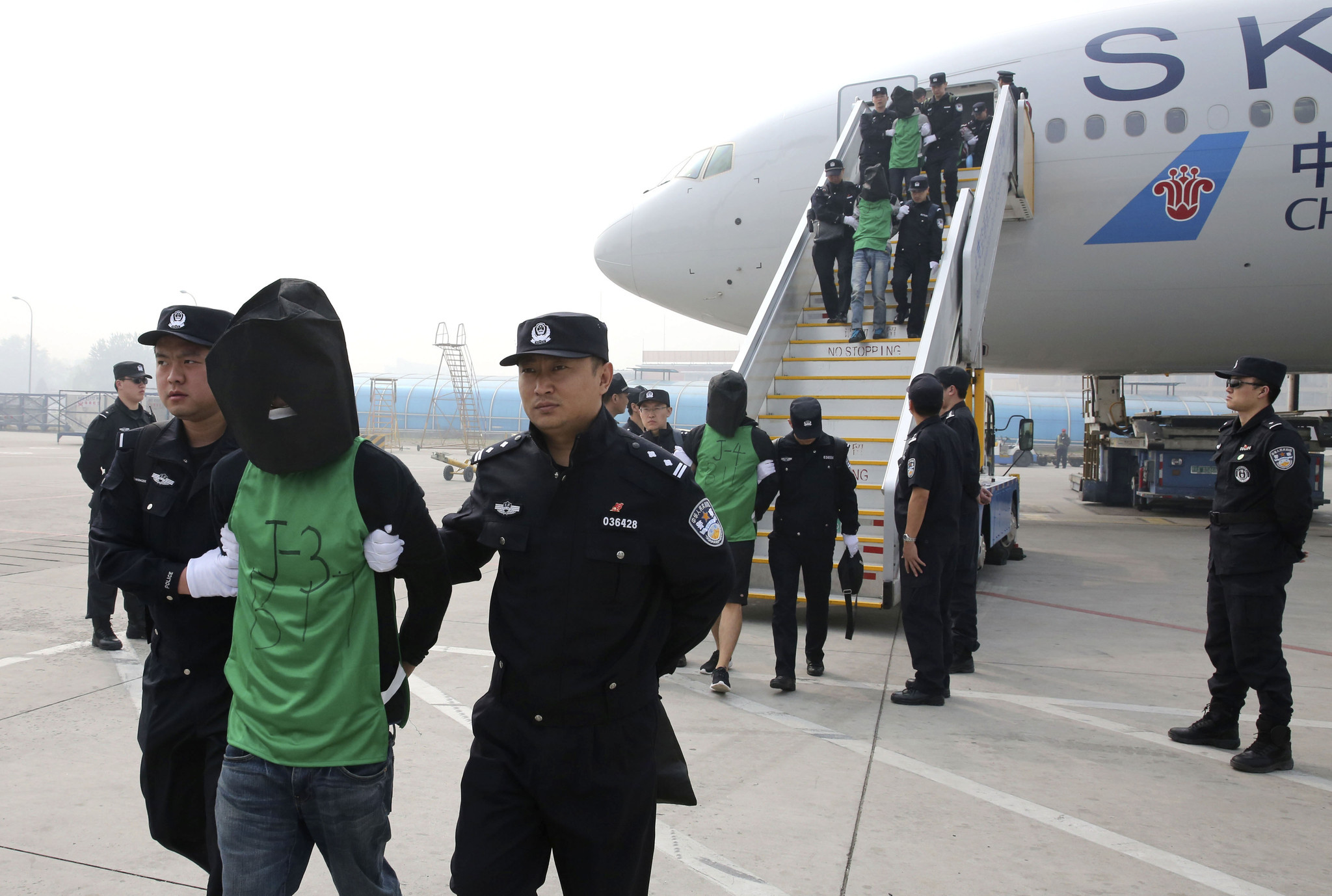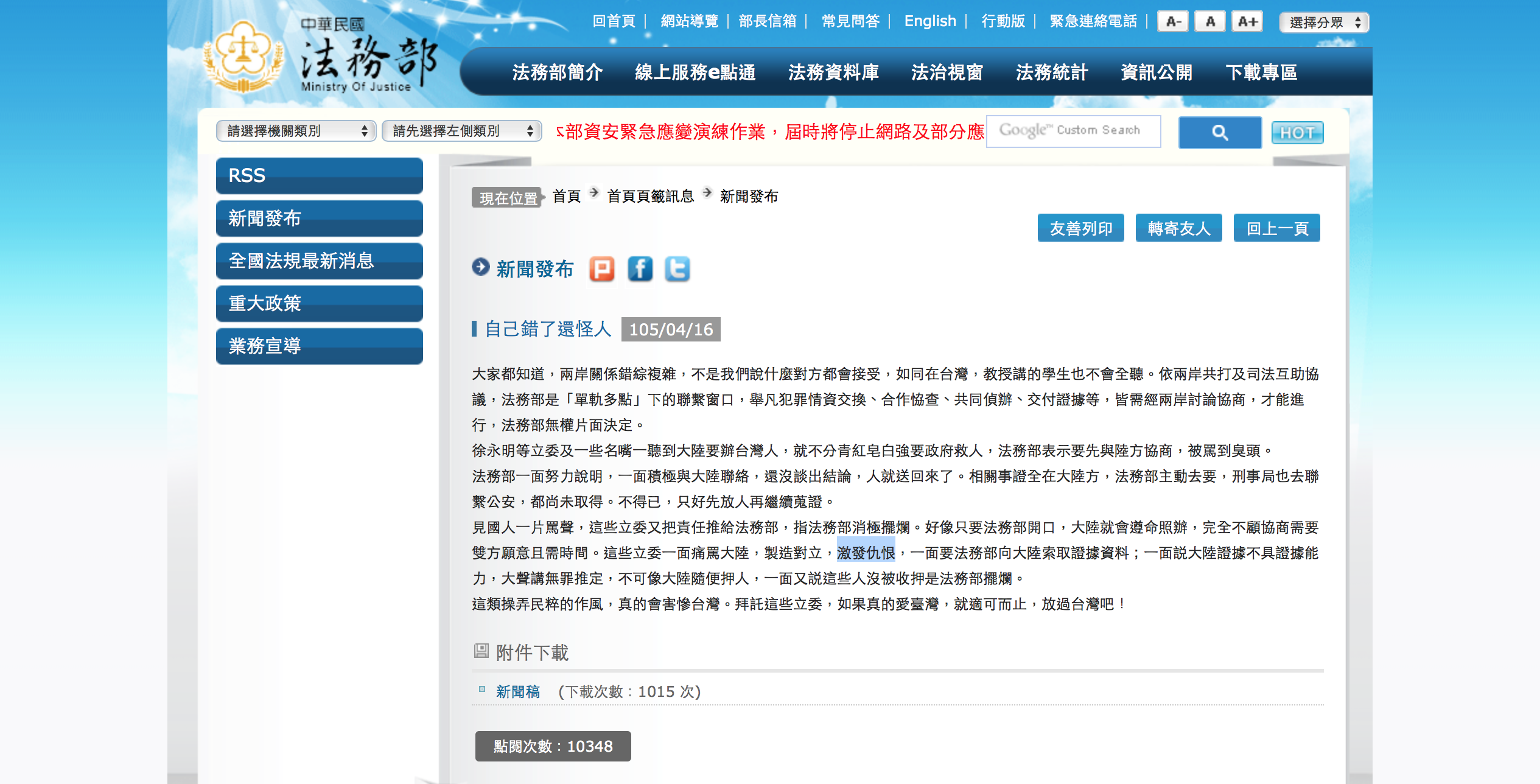by Brian Hioe
語言:
English
Photo Credit: Xinhua
QUESTIONS OF JUSTICE and the law have been a constant in discussions of the case of Kenyan deportations of Taiwanese citizen to China. Although it is legal to deport individuals who have broken the law to a third country, it remains a question as to the proper legal actions in this case, and what would be the just solution. The case has generally been hampered by inconsistent reports of what transpired to date, and there are no clear-cut answers of right and wrong, much less justice, here.
After all, if an early accusation against the actions of the Kenyan and Chinese governments was that it was a human rights violation to deport Taiwanese citizens to China, this is not without merit. There are large questions about how fair a trial Taiwanese suspects would receive in China, when state-run media has stepped in to extract confessions of guilt from suspects to parade on television in the middle of the trial process. Indeed, if some have raised the possibility that Taiwanese criminals would get off without punishment had they been deported to Taiwan, as occurred in the past few days the case of 20 Taiwanese deported to Taiwan from Malaysia in spite of calls by China for their extradition to China, the flipside of this is that legal punishment from China is likely be overly severe and beyond the pale of justice.
Even if as Chinese state-run media alleges that the fraud committed by these suspects led to deaths and suicides, this still does not mean that they cede their rights to a fair trial. On the contrary, it seems legalistic in nature to assume their guilt a priori before any trial rather than accord to the principle of maintaining innocence until proven guilty. As individuals under suspicion for wrongdoing, it should not be that suspects are invalidated from having all rights altogether—even if the concern as to criminals evading punishment is because this will damage Taiwan’s international reputation and contribute to Taiwan’s reputation as a haven for criminals. Individuals under suspicion for wrongdoing deserve a proper investigation before any form of legal punishment. Nor is it that criminals should be simply tossed to the wolves, as though they are devoid of all rights altogether—even in cases of severe crimes as murder or manslaughter, much less with the present charges leveled against suspects.
Although it seems quite unlikely that China secretly plotted this whole affair as a warning to Taiwan to maintain the 1992 Consensus, we can safely conclude based on the responses of the Chinese government and from Chinese state-run media that they are now using present events in order to do so. Though the timing was probably a coincidence, the Chinese government likely decided this was an opportunity they could jump on to send a warning to the upcoming Tsai administration.
 Taiwanese suspects being deported from Kenya. Photo credit: Xinhua
Taiwanese suspects being deported from Kenya. Photo credit: Xinhua
It is unlikely that Taiwanese suspects will receive a fair trial in China. Rather, it seems quite possible that they will be used as examples to intimidate Taiwan regarding the consequences of breaking with the One China policy. This would be the inherently flawed nature of the legal system of an authoritarian regime, particularly in cases regarding nationals from a country that China claims to be part of its territory, and occurring during a period of time in which the issue of China’s claims over Taiwan is especially politically sensitive.
Luo being grilled by the New Power Party’s Huang Kuo-Chang. Film credit: 立法院演哪齣?
Yet it would also be that the Taiwanese justice system has severe flaws if those guilty of crimes abroad can get off quite easily within Taiwan, as we see in the Malaysia case. The Ministry of Justice has been incompetent at handling this entire incident. When grilled on the matter by the New Power Party’s Huang Kuo-Chang, a former professor of law at Academica Sinica, Minister of Justice Luo Ying-Shay was not only unable to answer questions about whether the deportations were legal according to Kenyan law, but was unable to answer as to whether there had been legal precedents for the deportations, and claimed that regarding all these matters, the Ministry of Justice needed to gather more information before making a decision.
Luo also attempted to brush off dismissively when the case of a Taiwanese man dying in Cuba under mysterious circumstances after a Chinese extradition request was raised as a precedent of possible Chinese wrongdoing. Apart from first needing reminding that this case took place, her explanation for how the Taiwanese man deported to Cuba died brushed off the matter as a triviality—explaining the death of the man as “And then he just died” (然後他就死了). This gaffe has provoked much outrage and online mockery by netizens. Luo is popularly nicknamed “Law In Shit”, or “LIS” for short, by Taiwanese civil society as a result of her history of poor handling of legal matters, a pun on the similarity in pronunciation of “law” and “Luo.”
Luo unable to answer questions about the death of a Taiwanese man in Cuba. Film credit: 立法院演哪齣?
The Ministry of Justice has responded with a much derided public statement on their website, stating their faith in letting “the mainland” (大陸) handle the case, just that “the mainland” needs time. The Ministry of Justice also lashed out at NPP legislators for “populism” in criticizing the Minister of Justice—accusing them of “inciting hatred” (激發仇恨) and making swipes at “students who do not listen to their professors at all” (教授講的學生也不會全聽), an obvious reference to the Sunflower Movement and the New Power Party’s origins in it—and concluding by stating that “if you truly love Taiwan, this needs to stop” (如果真的愛臺灣,就適可而止). It later emerged that this statement was largely written by Luo herself. Given the incompetence shown by the top-level echelons of the Ministry of Justice, it may not be surprising that the Taiwanese justice system not only has failed to negotiate the complications of international law regarding Taiwan, China, and Kenya, but that there would be poor recourse to punish Taiwanese criminals who have committed crimes abroad within Taiwan. There would seem to be structural issues with the Taiwanese justice system writ large.
Unsurprisingly, it was pro-China political forces who have generally been willing to put their faith in China to address matters regarding the Kenya case. Luo is herself a KMT member and the Ministry of Justice’s public statement sounds rather KMT-ish. The KMT has since the Sunflower Movement forever been lashing out at “populist” attacks against it from Taiwanese civil society. Former New Party legislative candidate Yeh Yu-lan initially praised the handling of the incident, stating that the Taiwanese suspects would not have received punishment in Taiwan, and so handing them over to China was better for the realization of justice.
 The statement by the Ministry of Education
The statement by the Ministry of Education
Certainly, it is that if Taiwanese criminals can get away with crimes committed abroad, that is an issue. But if there have been some reflexive responses in defense of Taiwanese citizens, civil society has generally been highly critical of calls wholly placing faith in China that largely originate from their ideological enemies, the pro-China camp—in a manner which is not reducible to reflexive Taiwanese nationalism. Again, this is a dilemma on both sides in which the Taiwanese criminal justice system is too lax and the Chinese criminal justice system would probably make Taiwanese suspects into examples. As such, there are legal issues on both sides which bear pointing out, not just concluding that China is in the right here because of flaws with the Taiwanese legal system in punishing acts of fraud committed abroad.
The call for reforming punishments for fraud has, however, become a bipartisan matter with NPP legislator Hung Tzu-Yung and KMT legislator Chiang Nai-shin calling for reform of punishment for fraud commitment by Taiwanese citizens abroad. NPP legislator Hsu Yung-Ming, who was singled out in the statement released by the Ministry of Education and was among the most vocal critics the sending of Taiwanese suspects to China as a human rights abuse, has also criticized the Ministry of Justice for dereliction of duty in simply releasing the 20 Taiwanese suspects deported from Malaysia once they arrived in Taiwan. But the overall inadequacy of the Taiwanese justice system from the highest level downwards only points to the necessity of structural judicial reform within Taiwan. Ultimately, if we see the flaws of both the Chinese and Taiwanese legal system through present events, widespread and overarching judicial reform is what Taiwan is in dire need of.


 Taiwanese suspects being deported from Kenya. Photo credit: Xinhua
Taiwanese suspects being deported from Kenya. Photo credit: Xinhua The statement by the Ministry of Education
The statement by the Ministry of Education